Crushing the spirit
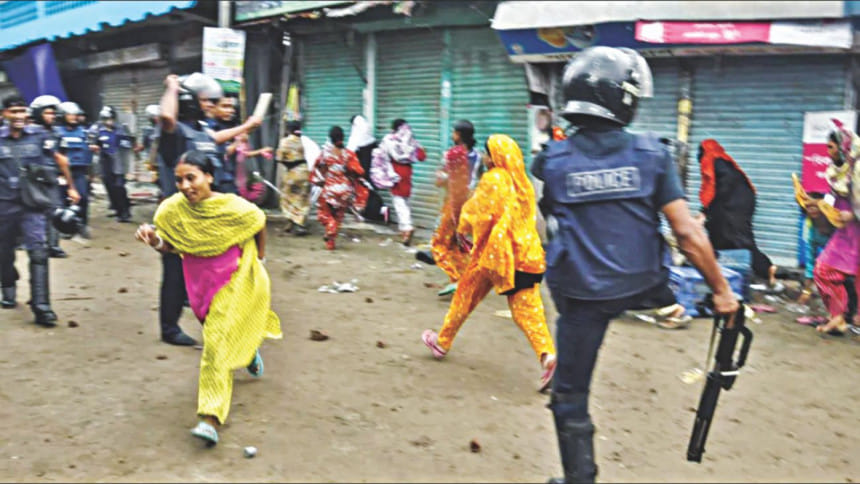
The minimum wage of garments workers has been declared at Tk 8,000 per month—and it seems, at this point, it is a signed and sealed deal. City life is going as is. There are no mass protests racking the city, disrupting our roads, our lives. Save for the lone rally here and there, there is really nothing to suggest that over four million workers have gotten only half the minimum wage they were fighting for.
Anyone who has observed the decade-long activism by RMG workers knows just how unnatural this is. Movements for minimum wage have been fought by workers on the streets, whether in 2013 or 2010. The demand for a minimum wage of Tk 16,000 itself gained momentum in such a movement in December 2016, when masses of garments workers swelled onto the streets of Ashulia. Demonstrations lasted for days, and 60 factories were shut down. The police met them with brute force: tear shell, rubber bullets, hot-water cannons. At least 1,600 workers lost their jobs The Daily Star reported, quoting the police.
The long history of workers occupying the streets to make themselves heard raises the question: why are workers silent this time?
"It was difficult to get workers to come to demonstration programmes because they have been threatened by factory administrations and law enforcers," claims Taslima Akhter, President of Bangladesh Garments Sramik Samhati, one of the handful of organisations bringing out protest rallies denouncing the new minimum wage. Akhter's organisation belongs to a platform of 12 organisations that brought out a few programmes before and after the minimum wage declaration. None of those programmes saw the kind of worker attendance as the 2016 protests.
"We recently tried to organise in front of Rana Plaza but the workers were getting so many calls from the law enforcers that we had to downsize the programme completely," adds Akhter.
What is concerning is that this "pressure" does not only manifest in the form of arbitrary threats—workers and trade union leaders are at actual risk of being picked up.
The 2016 protests saw cases lodged against hundreds of workers and over a dozen trade union leaders prosecuted.
"When workers raised their voices in a peaceful manner in December 2016, the government and factory workers brought 14 different criminal charges against them," describes Kalpana Akhter, executive director of Bangladesh Centre for Workers Solidarity.
"During the crackdown, 39 worker union and federation leaders were arrested, of whom 32 were in prison for two and a half months, and they are still facing those charges."
The labour rights leader further goes on to explain how this has affected the workers' will to protest.
"This crackdown has pushed us back by at least two years. Top that off with the fact that this is the election year, and any protest can be coloured as having been instigated by the opposition political party," describes Kalpana.
S* Begum is one of those workers who cannot afford to get picked up again. The sewing operator claims to have been booked under a case for doing "anti-state" activities in 2016. Begum had actively participated in the Ashulia protests.
"I spent seven months in hiding, running away from the police, after they filed a case against me. I can't anymore," she says, when asked why more workers are not protesting.
"If I get arrested, who will look after my daughter? She's all the family I have," says Begum.
After the case, she lost her job, and accrued over Tk 70,000 in debt. "I could only get another job as a sewing operator after hiding my identity. No factory wanted to take me in because the police case against me is such that they can come and arrest me any time they want."
That does not mean she is not enraged by the fact that the minimum wage is barely a cut above their current wages.
"I am unable to accept this. Not only is the increase barely anything but we are already facing the consequences of demanding higher wages. The wages have not even been implemented
yet and the factory owners have already doubled the production target," she states.
"They are going especially hard on the helpers who cut thread…most days the helpers are not even being able to take time off for lunch! If they do, the supervisors start abusing them, saying that since they will get higher wages, they have to work harder."
****
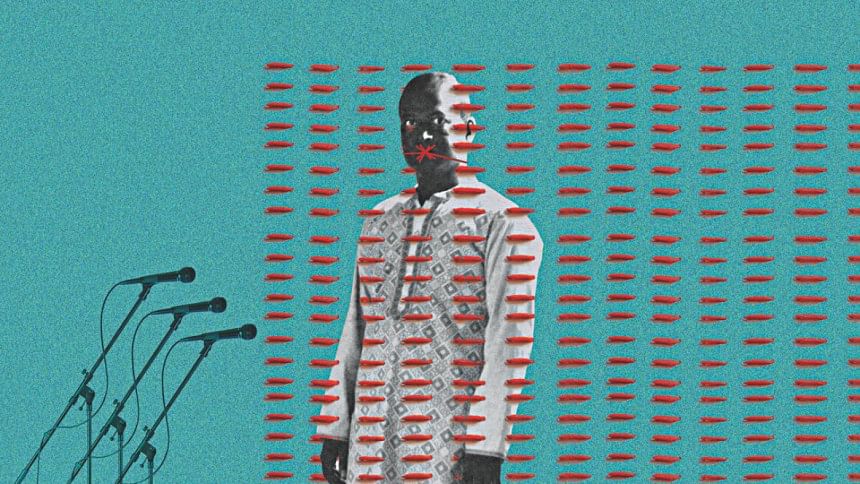
Here is something strange: some of those prosecuted were neither involved with the protests, nor were they anywhere near the area. It is almost as if they were prosecuted under the "just in case" clause, essentially shutting them up for the next few years to come. Those who were trade union leaders among them are now professing a reluctance to organise.
"Just a few days ago, the administration of a factory was clashing with its workers, and I could not go there since I have a case against me, and didn't want to be picked up by the police," laments Asaduzzaman Asad, an organiser of Bangladesh Independent Garment Worker Union Federation's (BIGUF) Gazipur Boardbazaar branch.
"I have to think twice before getting involved with anything and everything."
His colleague Golam Arif, who was made an accused in the same case, has a similar grievance. "Because of the case, the police have been trying to use me as a source to gather intel about what different garments worker groups are planning in reaction to the Tk 8,000 minimum wage declaration," he claims. Arif too feels like he has had to take a step back.
Both Golam Arif and Asad were prosecuted after the labour unrests of Ashulia in December 2016.
Except Arif and Asad are not even from Ashulia—they are from Gazipur—and the case wasn't even related to garments protests. The case was an old one from the election time violence of 2015, dug up more than a year later.
At 9:15 pm of January 4, 2015 a bus belonging to Shamrat Paribahan was set on fire in front of Surma Hotel in Joydebpur of Gazipur. There were no casualties. A subinspector of Joydebpur police station by the name of Mohammed Arshad Miah filed a case naming 50 people and 10 to 20 unidentified miscreants.
Among the names was one "Asaduzzaman Asad". About a year later, during the Ashulia labour unrest, the Detective Branch (DB) police arrived to arrest BIGUF's Asaduzzaman Asad.
"Detective Branch police knocked on the door of my apartment at approximately 10:45 pm of December 22, 2016.
I opened the door," describes Asad. He lived in an apartment right above the BIGUF office.
"They asked who Asad is and when I identified myself they grabbed hold of me and put me in handcuffs.
I asked if they had a warrant and the subinspector leading the team slammed a gun to my head," continues Asad.
"You dare to sleep in peace after inciting violence in Ashulia?" said the subinspector, as per Asad. "But I had nothing to do with those workers! I work with the factories in Gazipur," Asad explains.
Asad claims that he was then taken to the police's Detective Branch office in Gazipur. They tied his eyes for interrogation. Asad was finally sent to court on the morning of December 24.
It was when he came to court that he learnt he was being arrested for allegedly setting fire to the Shamrat Paribahan bus. "This is a false accusation," claims Asad. If Asad's account of the arrest is true, the officer arresting him had verbally accused him of instigating worker protests, that too at the time of the arrest. But the case he was being charged with was something completely out-of-context.
Besides, Asaduzzaman Asad is a common enough name in Bangladesh—where's the proof that the accused named in the case statement is the same Asad picked up by the police? Asad has proof that his inclusion into the case statement was an ill-motivated move. The accused Asad's father's name is listed as Abdul Hai—the organiser's father is actually Solaiman Ali Mondal.
Even more strangely, the statement says that the police got the names of the perpetrators by "asking people around the area where the bus was burnt". There was no real investigation to find out whether or not Asad was indeed guilty of burning a bus.
Golam Arif was also picked up in the same incident along with him, and accused in the same case. His name was not on the statement. A few days later the police dropped by the BIGUF office and arrested one of their staff Ranju, under a case relating to explosives.
"Ranju's case describes him as attending a secret meeting where crude bombs were being made," describes Rashadul Alam Raju, the vice president of BIGUF. "The police told me to come to the station to pick up the detained colleagues but I dared not go, or stay in Gazipur, for fear that I would be arrested too."
Raju argues that they were being arrested so that the Ashulia protests don't spill over to Gazipur. "We had police showing up at our office every day for two months."
The minimum wages have not been implemented yet. Arif was asked whether the scene is still somewhat quiet because the reality has not hit home yet. "The minimum wage will come into effect in factories after December—it remains to be seen how the workers will react then. Maybe there will be more support for the protests, maybe not. But let's see," he finishes.

 For all latest news, follow The Daily Star's Google News channel.
For all latest news, follow The Daily Star's Google News channel. 

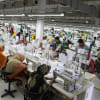

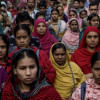
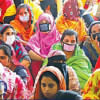
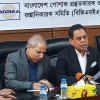


Comments